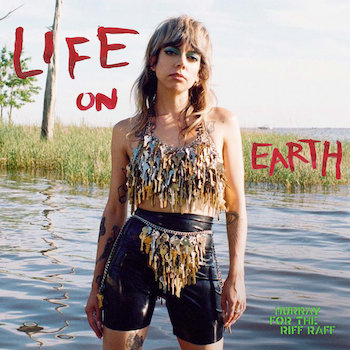Album Review: “Hurray for the Riff Raff” — Making Art Out of American Angst
By Matt Hanson
Life on Earth aches with the sadness of the human condition, touching on personal trauma and reaching into the malaise of a week of national bad news.
 New Orleans’s Hurray for the Riff Raff, which is the catchall term for whatever music the distinctly gifted Alynda Segarra wants to make, is back after five years with a superb new record, Life on Earth. The Navigator, the highly acclaimed previous effort, was loosely based on Bowie’s Ziggy Stardust story line and explored Segarra’s NYC roots and Puerto Rican heritage (their mother was a prominent city politician). The galvanizing song “Pa’lante,” from Spanish “to move forward,” was used by activists as a rallying cry. It was named one of the top 100 songs of the decade by Billboard. The value of Segarra’s music goes beyond its aesthetic merit, which draws from deep roots in punk and folk — there’s a vision that looks beyond music alone.
New Orleans’s Hurray for the Riff Raff, which is the catchall term for whatever music the distinctly gifted Alynda Segarra wants to make, is back after five years with a superb new record, Life on Earth. The Navigator, the highly acclaimed previous effort, was loosely based on Bowie’s Ziggy Stardust story line and explored Segarra’s NYC roots and Puerto Rican heritage (their mother was a prominent city politician). The galvanizing song “Pa’lante,” from Spanish “to move forward,” was used by activists as a rallying cry. It was named one of the top 100 songs of the decade by Billboard. The value of Segarra’s music goes beyond its aesthetic merit, which draws from deep roots in punk and folk — there’s a vision that looks beyond music alone.
Each song title on Life on Earth is written in all capital letters, reminiscent of the in-your-face fonts of zines and punk records. The cover tells you something about Segarra’s attitude: wearing multicolored beads and a furry hat, they stand knee-deep in some murky Louisiana water, sizing you up, looking pissed, ponderous, and roughly glamorous all at the same time.
“WOVES” opens the record with poignant synths and a soothing but slightly ominous melody. “You gotta run, baby, you know how to run”: that isn’t all that optimistic a sentiment, but Segarra sings it in a way that makes it sound almost encouraging. The record eschews a subdued kind of ’80s tonal palette: synthesizers aren’t used for the sake of pop glamour but to add percussion, accenting the songs with a little extra pathos.
You can sing along to each of the tunes on this record easily, especially anthemic tunes like “POINTED AT THE SUN.” I resist some of the lines: “And maybe there’s an answer?/ I’m a Pisces, not a Cancer/ I wish I could be there for you, baby/ But I’m just too much.” Ain’t that just the way? The lead single “RHODEDENDRON” name-checks, via a tenacious momentum, a few different types of flowers, from the lovely to the seemingly innocent. Savor Segarra’s crooning about “not knowing what it takes to carry on.” But don’t be lulled by the record’s accessibility. You quickly realize that Segarra expects more from the listener than singing along.
“PRECIOUS CARGO” is a sort of combination spoken word/rap spoken from the perspective of a migrant braving the extremely dangerous and politically fraught border crossing. “You sleep on the floor for seventeen days/ you sleep on the floor like a dog.” It’s important that we hear these voices, which are marginalized in the immigration debate. One person’s testimony fills the song’s coda, testifying to the suffering of people who risk everything for a new life, while being treated as subhuman throughout.
The record’s centerpiece is the deceptively catchy “SAGA.” The highly effective groove has you nodding along from the start, some light xylophone percussion accentuating the song’s driving forward motion. The lovely melody becomes even more lilting with the introduction of ethereal chanting as some horns appear to reinforce the beat. You’re all set to raise your hands and sing along — until the trauma at the heart of the song creeps up until it’s right in your face: “Screaming hysterical, I get/ Lost in an ocean of regret/ Burning inside-out/ Cold feet/ I was a kid, I was lonely … he pushed me down on the concrete/ Oh, I can’t speak … Nobody believed me.” That indifference is the saddest part of the song, repeated with increasing emotional resonance. When something awful happens, the cruelest blow is often how it’s met with silence.
When Segarra sings “I don’t know what it takes to carry on,” you know exactly what they mean, and at the same time it’s clear that this is actually not quite true. Life on Earth aches with the sadness of the human condition, touching on personal trauma and reaching into the malaise of a week of national bad news. It’s a feeling of helplessness before the forces of regression that pretty much everyone can relate to these days. But wallowing in anger and frustration does no one much good. Kudos to Hurray for the Riff Raff for making art out of American angst.
Matt Hanson is a contributing editor at the Arts Fuse whose work has also appeared in American Interest, Baffler, Guardian, Millions, New Yorker, Smart Set, and elsewhere. A longtime resident of Boston, he now lives in New Orleans.
Tagged: Alynda Segarra, Hurray For The Riff Raff, Life on Earth
